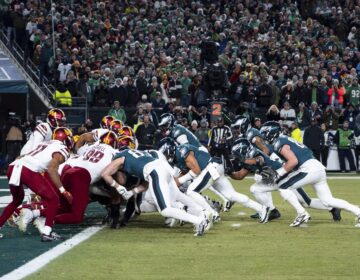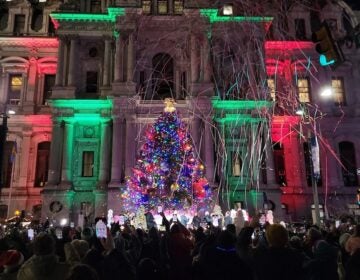Underground Railroad expert decodes songs that held practical advice for fleeing slaves
Listen
The Rev. Joe Williams (left)
The Moonstone Art Center in Philadelphia has coordinated a citywide festival about the Underground Railroad, the escape network that helped enslaved Africans of the South flee to the freedom of the North.
Charles Blockson — a foremost authority on the Underground Railroad — will be joined by former Dixie Hummingbird gospel singer the Rev. Joe Williams to lecture about the songs that guided the slaves to freedom. They will hold forth Thursday at 1 p.m. at the Blockson Collection on the campus of Temple University.
“Swing low, sweet chariot, coming to carry me home,” sang Blockson. “The chariot was what? The underground railroad train, coming to carry me home. They coded it.”
The lyrics of many “Negro spirituals” were loaded with a secret language. Consider “I Got Shoes”:
When I get the heavenI’m gonna put on my shoesI’m gonna walk all over God’s heaven.
“Heaven” was read at the time to mean Canada. Queen Victoria had decreed that if an American slave could make it onto Canadian soil, he or she would be free.
The coded lyrics served as inspiration and motivation to get started north. Other songs carried more practical instructions about how to get there:
Wade in the water, children,Wade in the waterGod’s going to trouble the water.
“Get into the water so the slave hunters coming after them, and the dogs — the bloodhounds — could not pick up the scent,” Blockson translated.
By and by, when the morning comesWhen the saints of God are gathered homeWe’ll tell the story how we’ve overcomeFor we’ll understand it better by and by.
“The codeword of that is ‘the morning.’ If it wasn’t clear enough to escape, you’ll understand it better in the morning,” said Williams. “We don’t understand how powerful music can be. This is the thing that kept them going, and kept them energized to keep them going in a hopeless situation.”
Maps and codes were communicated through patchwork quilts and tap dancing steps that mimicked African drumming. But one of the most effective ways to convey messages was through song.
About 100 years later, during the Civil Rights movement, those same songs would be reimagined again toward political ends.
WHYY is your source for fact-based, in-depth journalism and information. As a nonprofit organization, we rely on financial support from readers like you. Please give today.





